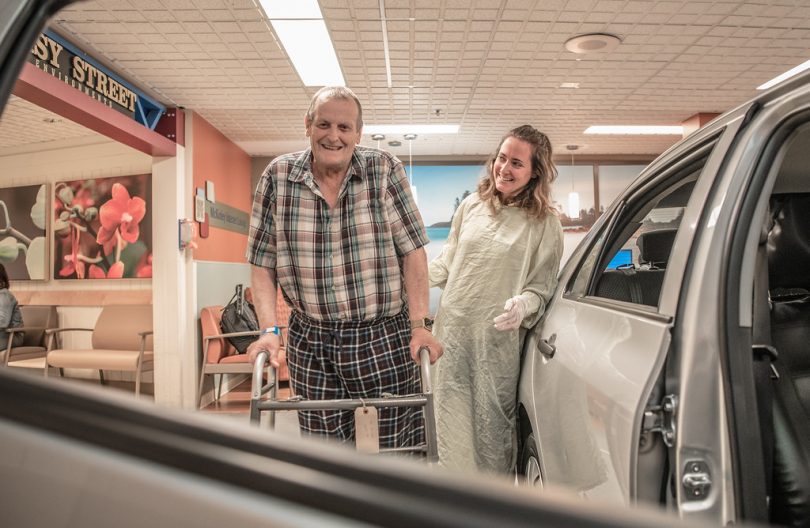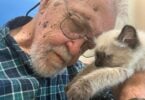Holy Family Hospital’s multipurpose room was filled with music, food, bright decorations and cheerful conversation on June 6th, but the guests of honour that day all had one very serious thing in common – they had survived a major stroke.

A harpist plays at the first annual Stroke Recovery Day.
Canada celebrates the importance of stroke care, research and recovery as part of Stroke Awareness Month each June, and this year Holy Family took part in honouring the often long and challenging road to recovery faced by many of our patients with the First Annual Stroke Recovery Day.
The event was driven and planned by two Patient Partners, with support from Holy Family’s spiritual health practitioner Anne Tuppurainen. Attendees included current patients undergoing rehabilitation treatment and discharged patients from the previous year, as well as their families and loved ones, staff, physicians, researchers and volunteers.

Pauline Westhead and her husband Paul at the Stroke Recovery Event on June 6th.
Pauline Westhead was suffering from left leg and left arm paralysis and had difficulty swallowing when she was transferred to Holy Family from Vancouver General after her September 2018 stroke. Thanks to the physiotherapy and occupational therapy she received during her six-week inpatient stay, she’s had good recovery of her leg and arm function.
For Pauline, attending Stroke Recovery Day was a chance to show the staff who had cared for her last fall just how far she had come. “It was a great pleasure for me and my husband to attend the stroke function at Holy Family. It brought back good memories, and I hope that I showed them that patience and encouragement can go a long way in stroke recovery.”
Depending on the location and severity of a stroke, patients can experience changes in cognition, visual and perceptual function, and physical function that can affect the ability to perform tasks that many of us take for granted, such as getting dressed, going to the bathroom or cooking meals. Occupational therapy – in conjunction with other therapies such as physiotherapy and speech therapy – is used to get patients back to their regular activities.
This is where Easy Street comes into play.

A patient works with an occupational therapist at Holy Family’s Easy Street
“Easy Street is a unique therapeutic tool that incorporates real-world environments and obstacles into the rehabilitation process and provides a realistic setting where patients can practice functional skills that are necessary to re-enter their community,” says Leah Swantje, occupational therapy site leader at Holy Family.
Easy Street has a grocery store, a bank machine, a car (to practice getting in and out of, or putting groceries in the trunk), as well as curbs and other obstacles found in every community. Using a realistic environment allows patients to practice these necessary skills in a safe, non-threatening and contextually appropriate environment, while building endurance.
Holy Family Hospital also has Easy Suite on site, which is a home-like environment with a bedroom, kitchen and full bath to practice getting in and out of bed, cooking a meal, or getting on and off the toilet and in and out of the shower.

A patient washes her hands in the Easy Suite kitchen.
“Patients report that practicing these real skills in a safe and supported environment is better than pretending to do or simulating the task”, says Leah. “It supports patients in reaching their identified goals.”
For Pauline Westhead, she credits much of her recovery to her care team at Holy Family. “The medical, nursing, and therapy staff at Holy Family were superb. I especially appreciate the care given to me by the nurses, who I referred to as my angels, as they were always available and helpful. Dr. Kwong and Dr. Gibson provided a very high level of medical care, and my occupational therapist, Michelle, physiotherapist, Chelsey, and rehabilitation assistant, Sheldon, were remarkable for their skill, patience and understanding.”
As the largest referral center for rehabilitation in British Columbia, Holy Family offers intensive therapy for older adults to overcome impairments caused by strokes. The site houses a 65-bed inpatient rehabilitation unit and extensive treatment areas that facilitate more than 1,500 outpatient visits annually.





